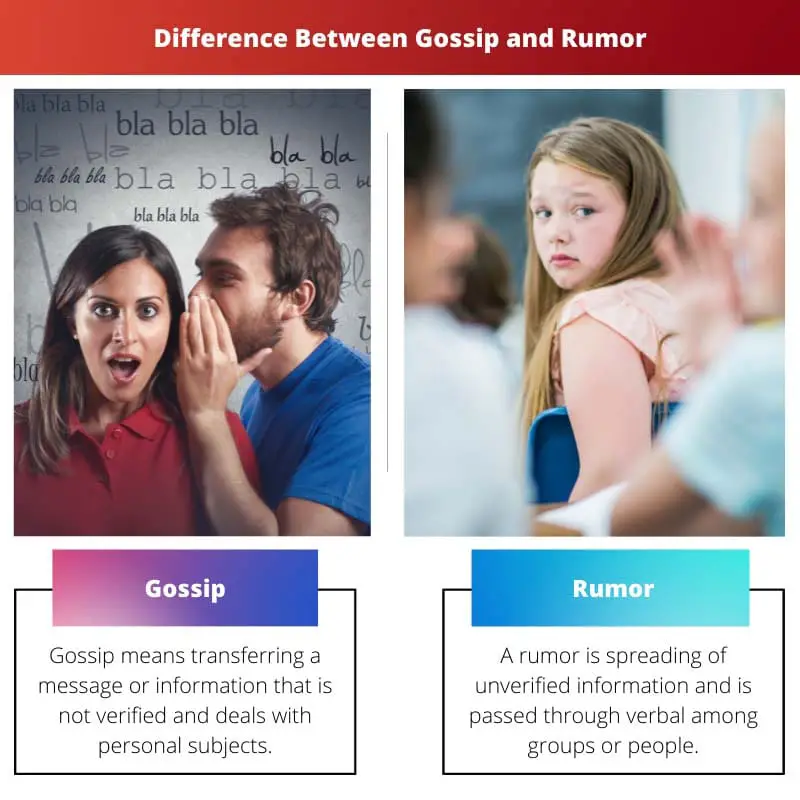People talk differently, and there are many forms of communication, and we all know that. However, it is not only face-to-face communication that happens all the time. Some things happen secretly too.
Things like gossiping and rumours are considered to be interactions, but they are informal ones. These things happen mainly because an individual wants to share a piece of personal information with the other person.
Gossip and rumours can occur anywhere, and you might have been a part of a gossip or a rumour.
Key Takeaways
- A gossip is a form of informal communication that involves sharing information about someone that may or may not be true. At the same time, a rumor is a story or information widely circulated but may need to be verified.
- Gossip is more personal and may involve sharing information about someone’s life, while rumors may involve information about events, organizations, or institutions.
- Gossip can harm someone’s reputation and relationships, while rumors can cause confusion, anxiety, and speculation.
Gossip vs Rumor
Gossip are defined as informal or casual transmission of evaluative information, verified or unverified, about a person who is absent during the conversation. A rumor is a story which may not be true. Everyone may be talking about the rap superstar who stopped for ice cream in your town, but until there’s proof that it really happened, the whole thing is just a rumor.

Gossip can happen between two people or even among groups of people. Gossips mainly happen when a person trusts someone or a group of individuals.
Trust is the key factor why gossips take place in the first place because gossips contain personal information in most cases.
Comparison Table
| Parameters of Comparison | Gossip | Rumour |
|---|---|---|
| Basis | Unsubstantiated information | Presumptions of factuality |
| Characteristic | Culture of Privacy | More public, universal interest |
| Primary motive | To achieve status and ego needs in the society | To cope with uncertainty |
| Definition | Gossip means transferring a message or information that is not verified and deals with personal subjects. | A rumour, on the other hand, is the spreading of unverified information and is passed verbally among groups or people. |
| People Required | Gossip takes place; it can take place between two people. | Rumours start with one person spreading the information to others in an organisation or a group. |
What is Gossip?
Gossips are a form of communication that is considered an informal method because it happens between family and friends.
The information conveyed in gossip is a personal or private message. This is what makes a huge difference between gossip and rumours.
Gossip happens when a person trusts the other person or a group of persons because the conversations are private and happen to keep messages a secret.
You gossip when you are unsure of something, or you want a piece of personal advice for something.
However, the information shared in gossip is not verified, and the message can be either true or false.
Gossip is something that can be information that can have negative thoughts and is considered to be harmful.
Harmful gossip happens when people get together and someone has a negative view of something and shares it with another person. Then the other person might take the gossip seriously; thus, gossip like that becomes harmful.
Gossiping with your friends and families can be harmless, too, because gossips consist of jokes and making fun of others.
Suppose you have a best friend with whom you share all your thoughts and feelings; then it is harmless if you share messages about making fun of the other person or a separate person.

What is a Rumour?
On the other hand, rumour is spreading a message starting from one person to the whole organisation or within an institute.
Rumours can be harmful as the information conveyed or passed through may or may not be true at all, and this might lead to confusion too.
Suppose you have an important meeting in an organisation, but you hear several rumours that the meeting will not happen for some reason, and then you do not prepare yourself.
But, later, you see that the meeting has occurred, and you are in deep trouble.
Similarly, one must not believe in all kinds of rumours because it will lead to confusion until and unless the rumour becomes a formal notice or a message from a higher authority.
This is the reason why rumours are not encouraged at all.
Rumours might spread fake messages about a person, leading to the downfall of someone’s dignity.
It is suggested by most large organisations and institutions that there should be no spreading of fake messages in the organisations as it will affect the motivation and morale of the employees.

Main Differences Between Gossip and Rumor
- Gossip is encouraged in most organisations as it can lead to better relationships among people, whereas a rumor is not encouraged by people.
- Gossip is considered to be less harmful than rumors.
- Rumors can lead to confusion because it is dangerous if a message is fake.
- Rumors include unethical, unverified information, whereas gossip can have verified information.
- Gossips happen mostly among friends and families and are informal verbal communication.

- https://guilfordjournals.com/doi/abs/10.1521/aeap.15.5.357.23823
- https://www.tandfonline.com/doi/abs/10.1300/J075v23n02_07

The distinction between gossip and rumor is crucial, and this article does a commendable job of shedding light on their varied implications.
I find the article’s explanation of gossip and rumors to be comprehensive and enlightening. It’s crucial to be mindful of the impact of our words and the information we share.
The comparison table is particularly useful in understanding the differences between gossip and rumors.
The examples provided in the article effectively illustrate the potential consequences of engaging in gossip and rumors.
Ironic how gossip can be both harmless and harmful, depending on the context. It’s a complex form of communication that warrants careful consideration.
Very informative article! I appreciate the clear distinction between gossip and rumor, and how they can both have significant impacts on individuals and organizations.
I agree, it’s important to understand the implications of informal communication and how it can affect people’s lives.
I appreciate the detailed exploration of gossip and rumors. It highlights the importance of critical thinking and discernment in our communication.
This article provides valuable insights into the nature of gossip and rumors. It’s crucial to recognize the potential harm caused by these forms of communication.
I found the discussion about the cultural and psychological aspects of gossip and rumors to be thought-provoking. It prompts introspection about our own communication habits.
I beg to differ. Gossip can also be a means of bonding and sharing personal experiences. Sometimes, it’s not always harmful.
I see your point, Harry. Gossip can indeed serve as a form of social bonding and connection in certain contexts.